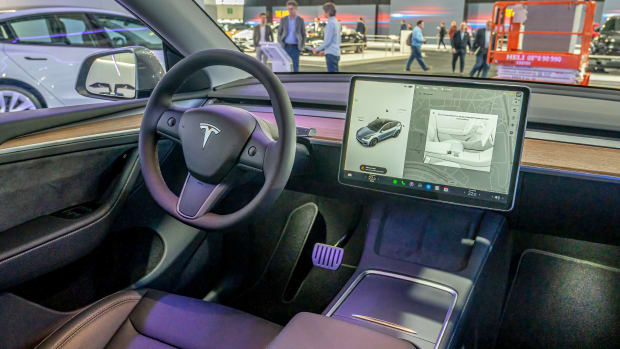
Panasonic (PCRFY) has got some bright ideas.
The Japanese electronics company, which started off in 1918 as a light bulb socket manufacturer, is looking to light up the electric vehicle market.
The company recently confirmed that it will build a third EV cell factory in the U.S. according to Automotive News, citing Panasonic Energy’s CEO Kazuo Tadanobu, who spoke at the company’s annual business strategy meeting.
The location of the new factory will be announced by March 2024.
Panasonic currently operates a manufacturing facility with Tesla (TSLA) at the electric vehicle maker’s Gigafactory Nevada plant, while a second battery plant is being built in De Soto, Kansas for about $4 billion.
And now the company plans to expand production of electric vehicle batteries at the Nevada location by 10% within three years.
Tesla Wants Batteries
Panasonic has accelerated plans to increase battery production capacity, responding to pressure from the EV maker
Tesla recently told Panasonic that it would "buy as much as [Panasonic] can make," according to an executive at the Japanese manufacturer, hinting at Tesla's scramble to secure batteries in the increasingly competitive EV industry, according to Nikkei Asia.
"The more batteries we make, the more we can make money," the unnamed executive said.

Sjoerd van der Wal/Getty
Panasonic Energy, an affiliate of Panasonic Holdings, will install a 15th production line at Gigafactory Nevada, Nikkei Asia said, citing people familiar with the matter. The new line is scheduled to begin operation in one to two years.
Annual production capacity at the facility is estimated to increase about 10% from the current 38 gigawatt-hours to 39 GWh, enough for 500,000 to 700,000 Tesla Model 3s.
North America is expected to see a lot more electric battery plants in the next few years.
Increased Battery Production
The Department of Energy (DOE)’s Vehicle Technologies Office said that between 2021 and 2030), the total battery manufacturing capacity will increase nearly 20 times.
A report by Argonne National Laboratory describes a new "battery belt" in electric vehicle production.
The report identified Michigan and Kentucky as key states for EV battery production through 2030, with each of these states supplying between 97 and 136 gigawatt-hours’ worth of battery capacity by the end of the decade.
Georgia, North Carolina, Ohio, Tennessee and Kansas would also be important contributors.
“We are beginning to see EVs really gain a broader foothold in the market, and this trend will only accelerate throughout the remainder of the decade,” Argonne energy and environmental analyst Dave Gohlke said in a statement.
Gohlke said that since last year there has been roughly one new announcement of a new battery development or EV manufacturing project every few days, a dramatic increase even since the beginning of the pandemic.







